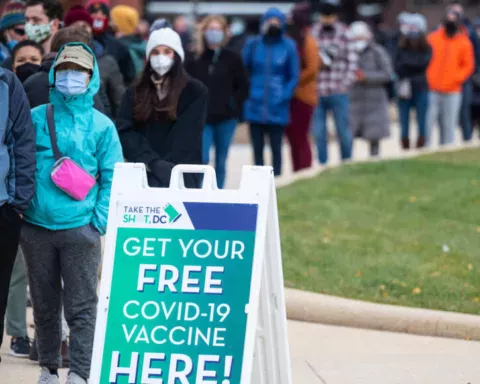Six cases of the new omicron variant of COVID-19 have been found in Scotland. The Scottish government said Monday it is not yet known where the individuals contracted the virus, but some of the cases may be due to community spread and not direct travel.
Two omicron cases were also detected in Canada Sunday. Ontario Health Minister Christine Elliott said the people in Ottawa had traveled to Nigeria, which is not in the southern African region where officials say the virus mutation has emerged.
Dutch health officials said Sunday 13 people who recently arrived in the Netherlands on flights from South Africa have tested positive for the new omicron variant of the coronavirus.
The passengers were part of a group of 61 who tested positive following their arrival in Amsterdam Friday. The announcement came shortly after Australia said two cases of the variant were discovered in passengers who recently arrived in Sydney.
Israel and Morocco closed their borders to all foreign visitors Sunday and Japan announced a ban to take effect Tuesday, following news of the new COVID-19 mutation detected in southern Africa. Other countries have limited their travel restrictions to visitors from Africa’s southern region.
South African President Cyril Ramaphosa said his country is “deeply disappointed” by the travel bans. “These restrictions are completely unjustified and unfairly discriminate against our country and our southern African sister countries,” the South African leader said. “The prohibition of travel is not informed by science nor will it be effective in preventing the spread of this variant. The only thing the prohibition on travel will do is to further damage the economies of the affected countries and undermine their ability to respond to and also to recover from the pandemic.”
The World Health Organization has called for caution as countries have quickly moved to close their borders.
“It is not yet clear whether Omicron is more transmissible . . .compared to other variants, including Delta,” the WHO said Sunday in a statement. “The number of people testing positive has risen in areas of South Africa affected by this variant, but epidemiologic studies are underway to understand if it is because of Omicron or other factors. . . There is currently no information to suggest that symptoms associated with Omicron are different from those from other variants.”
Concern over the variant has prompted many countries, including the United States, Canada, Brazil, and some European Union nations, to restrict or ban travel from southern African countries.
Suspected cases have also emerged in several other European countries. “Inevitably, it will be here,” top U.S. epidemiologist Anthony Fauci said Sunday on ABC-TV’s This Week. “The question is will we be prepared for it? If and when, and it’s going to be when it comes here hopefully, we will be ready for it,” Fauci said.
Fauci and members of the White House COVID-19 Response Team briefed U.S. President Joe Biden on the latest omicron developments Sunday, the White House said in a statement.
“Dr. Fauci informed the President that while it will take approximately two more weeks to have more definitive information on the transmissibility, severity, and other characteristics of the variant, he continues to believe that existing vaccines are likely to provide a degree of protection against severe cases of COVID,” the statement said.
The White House said Biden will deliver an update Monday on the U.S. response to the omicron.
The swift moves by some countries to seal their borders to travelers from Southern Africa have prompted some South African officials and scientists to say they feel like they are being “punished” for their transparency in reporting the variant.
Scientists had warned that vaccine inequity was likely to result in mutations of the COVID-19 virus. While millions of people in Africa have not received even one of the COVID-19 shots, some Western countries are providing booster shots to their populations.





